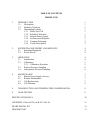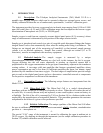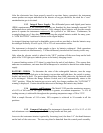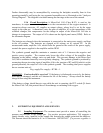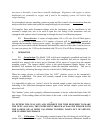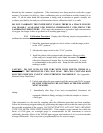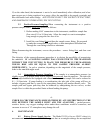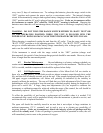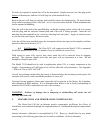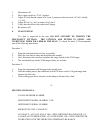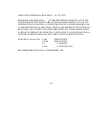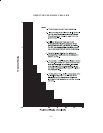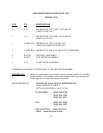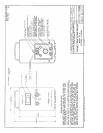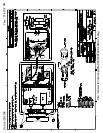
No tools are required to replace the cell in the instrument. Simply unscrew (ccw) the plug at the
bottom of the analyzer, and the cell will drop out of the manifold cavity.
Remove the new cell from its package, and carefully remove the shorting clip. Do not touch the
silver-colored sensing surface of the cell -- as it is covered with a delicate Teflon membrane that
can be ruptured in handling.
Place the cell on the end of the manifold plug, so that the sensing surface of the cell is in contact
with the plug, and the electrical contact plate end of the cell is facing upwards. Insert the cell
and plug into the manifold cavity, and screw the plug back into place. Apply as much pressure
as you can with your fingers, but use no tools.
After the cell has been installed, purge the instrument with an inert gas (or the sample), and then
proceed as directed in Section 3.2.1.
4.4 Cell Warranty
. The Class B-2C cell employed in the Model 311D is warranted
for 80,000 percent-hours or six (6) months of service (whichever occurs first).
With regard to spare cells, service time starts when the cell is removed from its shipping
package. The customer should stock only one spare cell per instrument at a time. Do not
attempt to stockpile spare cells.
The Model 311D should not be used in applications where CO
2
is a major component in the
sample. Concentrations of 1,000 ppm or less will not effect the cell performance. See Appendix
- “Effect of CO
2
on B-2C Cell Life.”
If a cell was working satisfactorily, but ceases to function before the warranty period expires, the
customer will receive credit, toward the purchase of a new cell.
Customer having warranty claims must return the cell in question to the factory for evaluation,
after obtaining an RMA number. If it is determined that failure is due to faulty workmanship or
material, the cell will be replaced at no cost to the customer.
-8-
WARNING
: Evidence of damage due to tampering or mishandling will render the cell
warranty null and void.
5. TRANSDUCTION AND TEMPERATURE COMPENSATION
The Micro-Fuel Cell has an inherent positive temperature coefficient, the effects of
which have been minimized through the implementation of a calibrated thermistor compensation
circuit.
Internal electronic calibration is accomplished by TAI. However, should there by any doubt
concerning it, the following procedure can be used to recalibrate. Refer to schematic.



